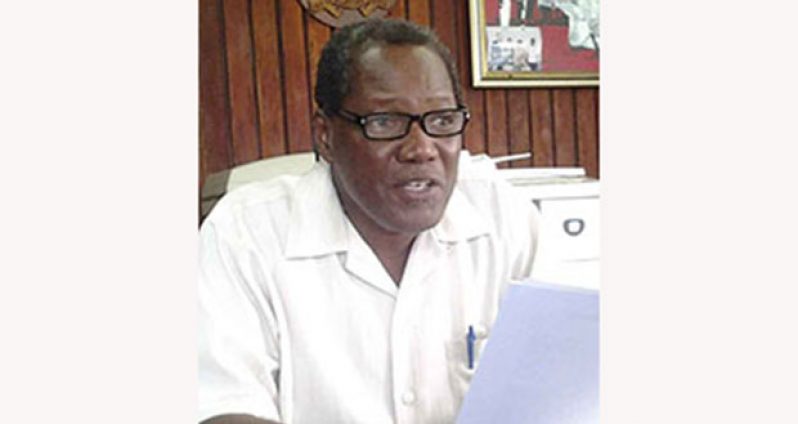By Alva Solomon
THE Guyana Public Service Union (GPSU) has viewed the report of the Commission of Inquiry (CoI) into the Public Service as a credible starting point for the restructuring of the public service sector.The body has expressed disappointment that wages and salaries for public servants have not as yet been increased, but has, at the same time, expressed disagreement with a recommendation contained in the CoI report that the National Assembly should be the ultimate decision-making forum in the event of a dispute regarding wages and salaries. This, the GPSU says would bypass the traditional process of conciliation and arbitration talks.
Speaking to this publication on Monday in a brief interview at the GPSU Headquarters at Shiv Chanderpaul Drive and Regent Road in Bourda, Georgetown, First Vice-President of the GPSU, Mortimer Livan, and several executive members of the body, revealed that the union’s executive is still studying the report.
Livan said the issue of wages and salaries, which has been a highly anticipated subject by most public servants, was disappointingly not mentioned. However, he noted that the report points to establishment of a wages commission, which he noted is “almost similar” to the GPSU’s proposal of a wages policy.
He said the CoI also recommended multi-year proposals on the issue, but he noted that there was no mention of timelines. “It’s very vague,” he said, noting that Government does not have to follow the recommendations put forward in the report.
Livan also said that GPSU membership on the Public Service Commission was brought into question by the CoI, and he noted that the union finds “very disturbing” any “insinuation” that the trade unions are biased.
He said the commissioners mentioned that the GPSU membership on the Public Service Commission (PSC) was one of a conflict of interest, something to which the union objects. “We have been there over a period of time, we look for people who are professional and have integrity,” he said of the GPSU’s membership on the PSC. He noted that the GPSU’s two members are up against several from the Public Service Commission (PSC).
Another CoI recommendation which the GPSU discussed during the interview was that the Judicial Services Commission (JSC) should appoint members of support staff of the judiciary, a process which has been under the mandate of the Public Service Commission.
Trevor Daly, a GPSU economic affairs committee member, said the report was extensive, in keeping with its terms of reference. He said the union supports the commissioners’ recommendation that consideration should be made in drawing parallels between Guyana’s Public Service and the private sector with those of the rest of the Caribbean region.
GOOD PLATFORM
“While specific numbers were not recommended for wages and salaries, that is a good platform to build on,” Daly said.
He said there should be a timeline regarding the implementation of the recommendations of the report, as he noted that the GPSU is prepared to enter into wages and salaries’ negotiations following the receipt of the report by Government.
According to the union’s executive, the CoI has recommended that efforts should be made to amend the 1997 edition of the Public Service Rules. Livan said moves were made in 2004 to amend those rules. He added that while the commissioners called for the rules to be amended, “(the report) stopped short of specifically stating (that) it should be done in concurrence with the GPSU”.
He said any amendment which affects the conditions of service of public servants should be done in collaboration with the GPSU.
Speaking on the subject of public servants, Daly noted that there are several statutory bodies which evolved out of the Public Service and are now semi-autonomous agencies “which fall under ministerial control”.
“Ever so often, we have seen the Public Service Rules being applied conveniently. That has to be stooped, and there has to be a clear commitment from Government to treat with these agencies,” he explained.
He said such agencies are often excluded when the issue of wages and salaries arise. However, he noted that the reporting protocols for those bodies are not identifiable with the Public Service, although the same reporting methodology is required.
The GPSU executive is of the opinion that the commission’s recommendation for the removal of the conciliation/arbitration mechanism from disputes defeats the purpose of inclusiveness.
“One of the things we do not agree with, in fact, is that the recommendations point to the National Assembly should there not be an agreement with Government,” Livan said.
He said taking the issue to the National Assembly essentially gives Government the advantage, since that forum is controlled by the government of the day.
The GPSU executive membership will continue to peruse the report, and the union is expected to make public its recommendations in the days ahead.
Professor Harold Lutchman led a three-member panel, which included Human Resources Management and Organisational Development specialist Sandra Jones, and Samuel Goolsarran, in conducting an inquiry into the Public Service. Subsequent to submission of that report, President David Granger noted, during an edition of the Public’s Interest, that it would be used as a basis on which modifications can be made to emoluments for Public Servants.



.jpg)









